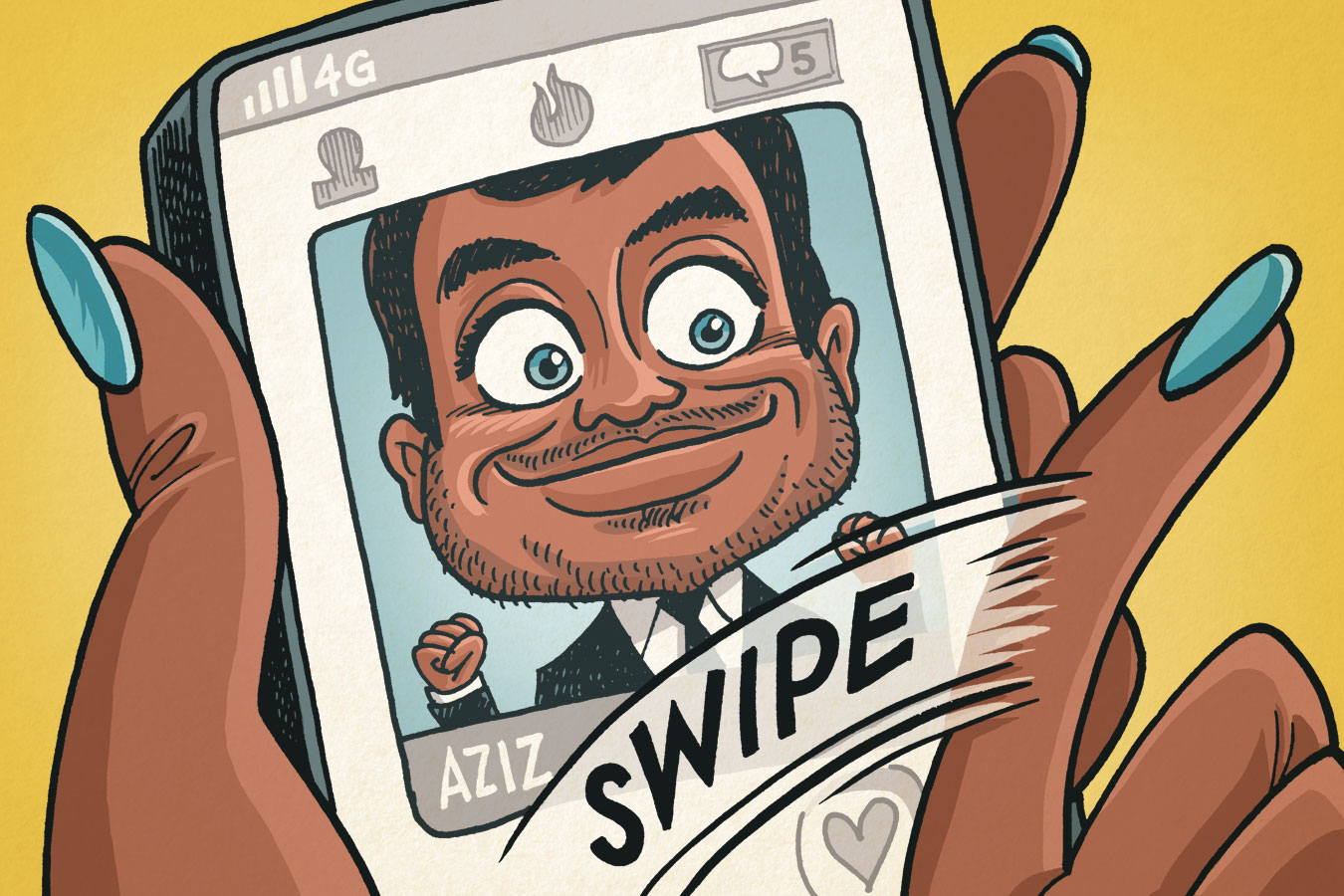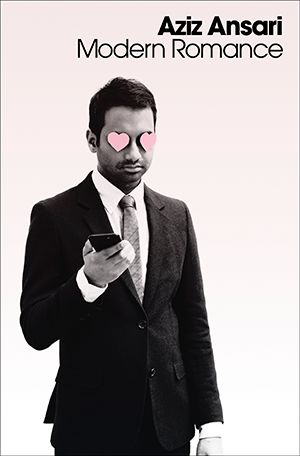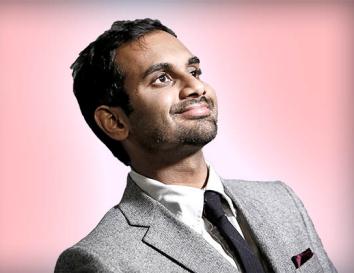
Slate is an Amazon affiliate and may receive a commission from purchases you make through our links.
Aziz Is Typing …
The sly, sweet wisdom of the comedian’s manual for dating in the digital age.

Illustration by Kevin Cannon
Aziz Ansari was crushing on a girl we’ll call Tanya. As Ansari tells it in Modern Romance, his new book on love in the time of the smartphone, the pair hit it off at a mutual friend’s birthday party back in 2012. He invited her over to his place for a cocktail, and they spent the evening listening to Beach House and making out. A couple of days later, Ansari painstakingly crafted a follow-up text inviting Tanya to Beach House’s next show. It was “a nice, firm ask with a little inside joke thrown in,” Ansari notes. “I was pretty confident.” Soon, those little iPhone dots appeared below the message, “the smartphone equivalent of the slow trip up to the top of a roller coaster.” Tanya was writing back! And then she wasn’t. The dots vanished. Minutes passed. Then hours.
Over the course of the next day, Ansari weathered the emotional storm that rains down on everyone who has ever waited for the text back: Paranoia (“Oh no, Tanya has died, and I’m selfishly worried about our date”); self-doubt (“I asked too many questions. What the fuck was I thinking?”); bargaining (“Okay, maybe she’s busy with work. No big deal”); social media stalking (“I check Instagram, and this clown Tanya is posting a photo of some deer. Too busy to write me back, but she has time to post a photo of some deer she saw on a hike?”); depression (“Why, Tanya, why?”); and finally, opening a new text window and moving on. (Ansari later met a pretty pastry chef named Courtney who responded to his first-date-invitation text in a matter of minutes; they’re still together.) Tanya never wrote back.
Tanya ghosted on Ansari, but he is not alone. The scenario he refers to as “Tanya’s silencing of 2012” unfolds in smartphones around the world every weekend, vexing texters of all genders. In charting this universal experience, Ansari has created something legitimately new. Traditional dating manuals tell straight women how to convince men to commit to them (The Rules; He’s Just Not That Into You; Act Like A Lady, Think Like A Man) or instruct straight men how to trick women to have sex with them (The Mystery Method: How to Get Beautiful Women Into Bed; The Professional Bachelor: How to Exploit Her Inner Psycho), but few guidebooks address men and women at once. The 1992 classic Men Are From Mars, Women Are From Venus was written for a gender-neutral audience, but it rests on the premise that men and women are so dissimilar that they might as well have been born 74 million miles away from one another. Modern Romance starts from the assumption that the men and women who swipe each other’s Tinders and text each other’s phones and deep-like each other’s Instagram photos in the hopes of eventually making out with one another actually have a lot in common. (Though as Ansari admits, the book largely focuses on straight people who are well-off enough to enjoy “intense and intimate relationships with their expensive smartphones.”)
Modern Romance feels a bit like the sweet little brother to Neil Strauss’ The Game: Penetrating the Secret Society of Pickup Artists. Like Strauss’ 2004 best-seller, Modern Romance styles itself as a personality-driven piece of pop sociology. Ansari teamed up with NYU sociologist Eric Klinenberg for the book, and they undertook what he calls a “massive research project” into modern relationships: They scraped data from OkCupid and Match.com, staked out a corner of Reddit called Modern Romantics to attract anecdotes from around the web, and convened focus groups all over the world—of playboys in Buenos Aires, single ladies in Doha, sexually apathetic bros in Tokyo, serial adulterers in Paris, OkCupid burnouts in Los Angeles, and retired folks on the Lower East Side. They also co-opted the audience-participation portion of Aziz Ansari’s stand-up comedy routines: For the past few years, he’s been asking singles in his audiences to surrender their cellphones so he can analyze their awkward text exchanges in front of the crowd.

Also like The Game, Ansari’s book is rigged to appeal to the frustrated, vulnerable, and confused-in-love. As Ansari says of the hypothetical happily coupled reader: “Okay, why are you even reading this book about relationships? So you can see what mistakes sad, lonely people are making to cause them to have so much shittier lives than you?” But while pick-up manuals frame women as a puzzle to be solved, Ansari blames modernity for isolating would-be lovers and sowing confusion text message by text message. Ansari laments that his generation spends its Saturdays “staring at their phones trying to find someone or something more exciting than where they are” and waxes nostalgic about a time when “making sure the person shared your interest in sushi and Wes Anderson movies and made you get a boner anytime you touched her hair would seem far too picky.” That’s not a particularly progressive conceit—Ansari acknowledges that his rosy view of dating before the computer age may have been complicated by “my brown skin tone and racial tensions at the time”—but at least it puts men and women on equal footing. If you have a young man in your life at risk of falling into a PUA message board, have this book shipped to his bedroom at your earliest convenience.
Ansari is perfectly positioned to recast himself as our modern dating guru. He is, mercifully, not a pick-up artist, though he did kinda play one on TV. After spending seven seasons on Parks and Recreation as the clownish playboy-entrepreneur Tom Haverford, Ansari the actor has emerged as a lovable public personality with a winking swagger. The book jacket features a portrait of Ansari in a trim suit, a smartphone in his palm and a pair of pink construction-paper hearts covering his eyes. In one section, Ansari laments how online dating encourages people to judge each other based on superficial categories, and he recounts a time when he’d describe his ideal girl as a slightly younger, shorter brunette. Now, he’s enamored of a woman who is “two years older, about my height—OKAY, SLIGHTLY TALLER—and blonde.”
Ansari is also an open softie. After recounting one cute coupling tale, he writes: “I hope you aren’t holding an ice cream cone against your chest, ’cause your heart just warmed—and your ice cream just melted.” Distilled wisdoms include “treat potential partners like actual people, not bubbles on a screen” and “make sure you properly invest in people and give them a fair chance before moving on to the next one.” (He calls that “The Flo Rida Theory of Acquired Likability Through Repetition.”) In contrast to the sex-obsessed PUAs and the wedding-crazy dating gurus, Ansari approaches relationships like an actual human being. “When I’ve really been in love with someone, it’s not because they looked a certain way or liked a certain TV show or a certain cuisine,” he writes at one point. “It’s more because when I watched a certain TV show or ate a certain cuisine with them, it was the most fun thing ever. Why? I couldn’t type out why.”

Photo by Mike Windle/Getty Images for Variety
But Ansari is at his funniest when he’s lightly judging, and he dispenses with aggro dudes, pathetic doormats, and awful texters with a convivial charm. Some socially awkward young men “are clearly so confused that they have taken to wearing fedoras,” he writes. When one man totally flubs his first text to a woman he likes, Ansari real-talks him: “None of us know Will. He may be a kind, handsome man with a heart of gold. But all we have to go on is those messages. And those messages have shaped in our minds a very dorky, terrifyingly Caucasian weirdo.” And when one woman writes into the subreddit about how her boyfriend broke off their eight-year relationship with a text message—and how she later took him back, Ansari responds: “No offense, but at this point let’s take a moment to be thankful we are neither of the people in that relationship.”
Ansari doesn’t ignore the particular ways in which romantic relationships have traditionally put women at risk. He acknowledges that the confusion endemic to modern heterosexual relationships represents a vast improvement on the rigid old scripts, which denied women professional and personal agency. He calls people who forward sexts “pure human garbage.” When one man in an Argentinian focus group compares the women he dates to cuts of meat roasting on a grill, Ansari gives him the “Most Sexist Food Analogy of All Time: Meat and BBQ Division” award. He fears a dystopic future where technology advances to the point where men are just “teleporting dicks to your house on a regular basis.” He takes care to note that Tanya is a very nice person and that they remain friends. (The next time they ran into one another IRL, she apologized for the radio silence.)
But the book also affords women the agency to be assholes and doormats and weirdos and desperate freaks, just like men can be. “I don’t think we can defeat the insecurities and tendencies built into our internal psychology,” Ansari writes of the mind games that infect early courtships. “But let’s all realize we are in the same boat dealing with the same shit.” That’s a valuable lesson for the young men who resent Tanyas for not texting back. And it’s also a good reminder for the young women who have shamed asshole guys on sites like Bye Felipe and Straight White Boys Texting, but have maybe never considered that women can be rude, disgusting, obsessive, passive-aggressive, and spacey, too.
The sole bummer about Modern Romance is almost a deal-breaker: It takes itself too seriously. The book could be a fun, lovely little manual, but it has aspirations of being an actual sociological tract. The reader can intuit when Ansari-the-comedian is writing and when Klinenberg-the-sociologist is taking his turn, and it makes for a rocky read. In one line, the guys are invoking terms like “reward uncertainty” and “scarcity principal” and briefing the reader on rat-pellet studies, and in the next, they’re setting up a joke. (“Did I just use the phrase ‘predetermined temporal sequencing’?” Ansari writes at one point. “Fuck yeah, I did.”) Part of the problem is that the sociological portions are such a snooze: Anyone who has scanned the magazine cover stories about the rise of online dating, the decline of marriage, or the dawn of emerging adulthood (or checked out Klinenberg’s most recent book, Going Solo: The Extraordinary Rise and Surprising Appeal of Living Alone) will not be surprised by the insights revealed here. Every time the book dwells on what a representative sample of 1,000 single people think, I’d rather hear what Aziz Ansari thinks. But hey, nobody’s perfect. I’d text back.
Modern Romance by Aziz Ansari. Penguin Press.
See all the pieces in this month’s Slate Book Review.
Sign up for the Slate Book Review monthly newsletter.
